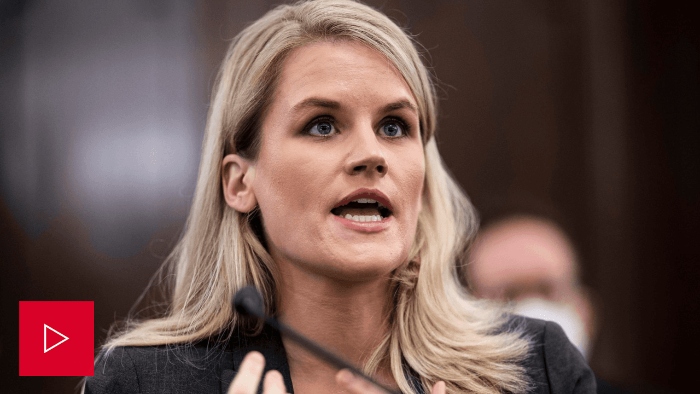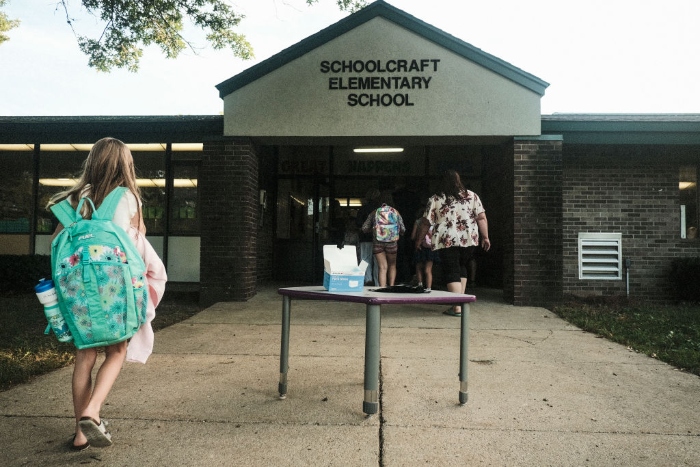| | |  | BY RENUKA RAYASAM | | With help from Tyler Weyant
| 
| DISLIKE — U.S. lawmakers largely united today behind the idea that Facebook’s role in society has become so large that Washington can no longer ignore it, even though they disagreed about how to rein in the global behemoth. Facebook whistleblower Frances Haugen’s three-hour congressional testimony this morning, where she detailed how the company understaffed safety programs and hid research showing its products’ negative effects, may mark a turning point for the social network, which has managed to deflect numerous scandals — and oversight — for nearly two decades. Nightly asked a group of experts and policymakers what the U.S. government should do, if anything, to regulate or sanction Facebook in the wake of Haugen’s allegations. Read their edited answers below. “I’d like to see Facebook and other social media companies return to when they functioned as public squares where people could talk freely. Not only does Big Tech censor and shadowban users they don’t like, but Facebook in particular is tweaking its product to exploit and endanger kids, particularly teenage girls, to maximize corporate profits. Usually when companies do this, they face very significant liability. The only thing that grants immunity from that liability to Facebook, Twitter and Google right now is Section 230 of the Communications Decency Act. That’s immunity Congress gave Big Tech because Congress believed social media companies would be neutral public fora — in other words, it wouldn’t be fair to hold the platforms accountable for things individual users said or did. I no longer think it makes sense for Big Tech to have any special immunity from liability that nobody else enjoys.” — Sen. Ted Cruz (R-Texas) “The testimony of Frances Haugen reinforces the need for a focused federal agency to oversee the digital platform companies, and for that oversight to have the flexibility to adjust to changes in both technology and corporate behavior. “For some time, the public and policymakers have seen only the effects of Facebook’s decisions — privacy invasion, market dominance and misinformation. Haugen has opened the window to the corporate decision-making causes of those problems and has made the case for regulatory oversight to protect the public interest in privacy, competitive markets and responsible curation of information.” — Tom Wheeler , former FCC commissioner from 2013 to 2017 “The government should look at regulating Facebook and social media in five areas: transparency, privacy, definitions, competition and accountability. “Congress could compel companies to make more data available to researchers and be more transparent about their decision-making processes. We need privacy legislation that puts guardrails around how people’s data can be used and exposed — including for research. Congress needs to help Facebook define what content constitutes things like a political or issue ad and what — if any — restrictions political figures and organizations should have online. Fourth, they need to put in rules that help to increase competition such as requiring data portability so that people can port their network of friends to new platforms. Finally, we shouldn’t allow CEOs like Mark Zuckerberg to have no accountability for their decisions. Right now there is no recourse for when people think he’s made the wrong decisions.” — Katie Harbath, founder of Anchor Change, former Facebook public policy director and former chief digital strategist for the National Republican Senatorial Committee “ Do nothing. It is much more important to regulate the misinformation on Fox News and OANN and cable news in general, which are far more influential than Facebook.” — Kevin Kelly, founding editor of Wired Magazine Welcome to POLITICO Nightly. Keep reading for more ideas on Facebook and social media regulation. Reach out with news, tips and ideas for us at nightly@politico.com. Or contact tonight’s author at rrayasam@politico.com and on Twitter at @RenuRayasam. Programming note: Nightly will not publish on Monday, Oct. 11. But don’t worry, we’ll be back and better than ever Tuesday, Oct. 12.
| |
A message from UnitedHealth Group: Research shows that social barriers – including access to stable housing and nutritious food – can impact up to 80% of health outcomes. UnitedHealth Group is committed to addressing social determinants of health and has helped create 12,000 homes since 2011 and distribute more than 100 million meals since the pandemic began. See how we’re helping to advance health equity. | | | “Tech companies surreptitiously collect users’ data, which is then used to inform algorithms that show users what Facebook, Google, and Twitter want them to see. I introduced the SAFE DATA Act that would help put a stop to this by limiting the amount of personal information Big Tech can collect about its users and holding them accountable for misusing data in harmful ways.” — Sen. Roger Wicker (R-Miss.) “I would implore Congress to return to the numerous piled-up legislative drafts that have raised concerns around algorithmic bias, misinformation and other content-moderation processes of Facebook and similar tech platforms. This may also be an opportune time to push the urgency of national data standards that provide clear guidance in the burgeoning and disruptive digital economy now responsible for a range of decisions (and consequences) that affect everyday citizens.” — Nicol Turner Lee, director of The Center for Technology Innovation and senior fellow, Governance Studies, The Brookings Institution “Any successful regulation of Facebook and other social media firms needs to start with oversight, specifically the systematic sharing of anonymized data with researchers who can evaluate platforms’ effects on society. Such data might include how content is prioritized on a given platform; the most engaged-with content in a given day, week, month or year; information about targeted advertising; or statistics about content moderation decisions. With open access to data, investigations that we and others conduct can help keep people — and democracies — safe. Facebook’s failure to make data available helps actors push disinformation.” — Nina Jankowicz, director of External Engagement at Alethea Group and author of " How To Lose the Information War: Russia, Fake News, and the Future of Conflict"
| | | 
Face masks sit on a table outside of Schoolcraft Elementary for students and parents to wear when entering the building in Schoolcraft, Mich. | Matthew Hatcher/Getty Images | NOT REALLY AN OCTOBER SURPRISE — Before the candy bowls are stocked, the FDA hopes to have a treat for millions of parents across the country: An advisory committee is meeting Oct. 26 to consider authorization of the Pfizer/BioNTech Covid vaccine for children 5 to 11. Then the agency will make its decision, likely in a matter of days. Nightly’s Tyler Weyant chatted on Slack with deputy health care editor Lauren Morello about what will be considered at the meeting, how vaccines could be distributed to younger kids, and when the shots might be approved for the elementary school crowd. When the FDA committee meets, what issues regarding younger kids and vaccines will it pay particular attention to? Are there specific areas of concern experts have raised? The first big issue will be safety . Hundreds of millions of adults worldwide have safely taken the Pfizer shot — but kids’ bodies are different. Their immune systems aren’t fully developed. So it’s not a given that what is safe for grownups will be safe for elementary schoolers. Pfizer is testing a two-shot approach for kids, with each dose one-third the amount of an adult dose. The company said no major safety issues popped up in their late-stage clinical trial. But the FDA advisory committee will drill down into the safety data, and FDA staff will present their own safety analysis during the meeting. The panel will weigh the risk of any side effects against the risk of serious illness and death in unvaccinated children. A more practical issue is whether Covid vaccines can be given alongside routine childhood shots for things like measles and chickenpox. What do we know about possible plans to distribute vaccines to younger children once the shots are authorized? There are about 28 million kids in the U.S. between 5 and 11 years old. They’ll likely be able to get Covid vaccines through pharmacies and community vaccine clinics, just like teens and adults. The Biden administration has long hoped to distribute the vaccine to kids through their pediatricians’ offices, to help ease the fears of parents and children. But logistical concerns, like minimizing waste from multidose vaccine vials whose contents last only a few hours after they’re opened, mean that only the largest pediatric practices are likely to offer the shot. Are there any discussions about offering vaccines at school, say from a school nurse? Some schools have already started running vaccine clinics for teens, and could possibly do the same for younger children once they’re eligible. They’re following an example set by U.S. schools in the last century, when they helped immunize kids against diseases like typhoid and polio. But the politicization of the Covid response, and the vaccines in particular, may scare some school districts away. Speaking of that polarization, do officials have concrete plans to address possible vaccine hesitancy among parents of young children? The most recent survey from the Kaiser Family Foundation found that just 34 percent of parents would get their 5 to 11 year olds vaccinated immediately. Thirty-two percent would wait awhile, while another 24 percent said they’d never do it. The good news is that vaccine hesitancy is usually highest before a shot is available for a given age group. Once a vaccine is approved and people see friends and family taking it with no problems, hesitancy decreases. We’ve seen that pattern play out with adults and teens. So it’ll probably repeat for younger kids.
| |
| | HAPPENING THURSDAY – POLITICO’S FIRST EVER DEFENSE FORUM : President Joe Biden is making critical shifts in the Pentagon’s priorities, including fully withdrawing all U.S. troops from Afghanistan, scaling back U.S. military presence across the Middle East and rethinking the positioning of military forces around the world to focus more on China. Join POLITICO on Oct. 7 for our inaugural defense forum to talk to the decision makers in the White House, Congress, military, and defense industry who are reshaping American power abroad and redefining military readiness for the future of warfare. REGISTER HERE. | | | | | | | — SEC chair warns U.S. debt default would shock markets: Securities and Exchange Commission Chair Gary Gensler warned Congress today that a U.S. debt ceiling breach threatened to unleash significant volatility and disruption in financial markets , as lawmakers remained at odds over how to avoid a government default. Gensler said at a House Financial Services Committee hearing that the failure to raise Washington's borrowing limit would create uncertainty for banks, mortgages, automobile loans and other financial instruments reliant on U.S. Treasury bills. The federal government borrows money to cover its operations and debts by issuing Treasury securities to investors. — 9th Circuit blocks California law limiting private jails: A divided federal appeals court panel ruled today that a California state law aimed at phasing out private detention facilities in the state cannot be enforced because it is likely to unconstitutionally intrude on the federal government’s power. The 2-1 decision from the 9th U.S. Circuit Court of Appeals overturns a District Court ruling that upheld the 2019 California legislation, known as A.B. 32.
| |
| |  
| | | — White House: Biden has confidence in Fed’s Powell ‘at this time’: The White House said today Biden has confidence in Federal Reserve Chair Jerome Powell, hours after Sen. Elizabeth Warren (D-Mass.) said the central bank chief had “failed as a leader” amid fallout from financial trades made by top Fed officials last year. “He does have confidence in Powell at this time,” White House spokesperson Karine Jean-Pierre told reporters aboard Air Force One. — Youngkin continues call for ‘audit’ of election machines in Virginia: Virginia Republican gubernatorial nominee Glenn Youngkin continues to call for an “audit” of the voting machines in his state, an echo of the Republican push to investigate 2020 election results around the country following former President Donald Trump’s unfounded claims of fraud. “I think we need to make sure that people trust these voting machines,” Youngkin said at a Monday event hosted by a Richmond civics group, according to a video reviewed by POLITICO. “I grew up in a world where you have an audit every year, in businesses you have an audit. So let's just audit the voting machines, publish it so everybody can see it.”
| | | 
Two Chinese SU-30 fighter jets take off from an unspecified location to fly a patrol over the South China Sea. | Jin Danhua/Xinhua via AP | NEW FEARS OF THREAT TO TAIWAN — Tensions are mounting once more between Beijing and Washington, as China pushes a record-breaking number of warplanes into Taiwan’s air defense identification zone, Lara Seligman and Paul McLeary write. The friction has raised renewed fears of the Chinese threat to Taiwan and its potential to draw in the West, particularly at a time when the United States and the United Kingdom are operating three aircraft carriers along with their destroyer escorts nearby in the Philippine Sea. While a Chinese invasion of Taiwan is not imminent, experts say China is playing the long game and is likely to continue upping the pressure on the self-governing island whose disputed political status has long been a fraught subject. “We should think of China’s approach to Taiwan not as a bifurcated decision between war and peace but instead a continuous pressure campaign that can take various lethal and non-lethal forms,” said Eric Sayers, an expert in Asia-Pacific security policy at the American Enterprise Institute.
| |
| | BECOME A GLOBAL INSIDER: The world is more connected than ever. It has never been more essential to identify, unpack and analyze important news, trends and decisions shaping our future — and we’ve got you covered! Every Monday, Wednesday and Friday, Global Insider author Ryan Heath navigates the global news maze and connects you to power players and events changing our world. Don’t miss out on this influential global community. Subscribe now. | | | | | | | | |
4,626 The number of unruly passenger incidents on airlines this year, 3,366 of which were mask-related, according to the latest FAA statistics . The agency has initiated 849 investigations and has taken action in 177 cases as of Oct. 3. (h/t Oriana Pawlyk) |
| | | DANCING ON THE CEILING — The Senate GOP’s budget point man, Lindsey Graham, wants to make Democrats work hard to lift the debt limit — but not so hard that it threatens a cataclysmic default, Burgess Everett and Caitlin Emma write. Graham is carefully calibrating how hard to press his party’s opposition to raising the debt ceiling, and his ultimate goal is critical to understanding the Senate’s fiscal stalemate. He hopes to force Democrats “to pick a number” for how high the borrowing limit should go. That would mean using the complex tool of budget reconciliation, rather than a stand-alone vote to suspend the debt cap through the midterms. A vote to set a specific dollar figure opens the door for Republicans to launch attacks on Democratic incumbents in next year’s midterms. Yet Graham said he doesn’t want to string the process out so long that it actually puts the nation’s credit at risk. “I mean, I’m not going to be a complete asshole about it. But I’m going to make them take some tough votes,” Graham said in an interview.
| |
A message from UnitedHealth Group: UnitedHealth Group is committed to advancing health equity by addressing social barriers among the uninsured in underserved communities.
Using predictive analytics, we are expanding access to care by helping to proactively identify people most likely to need support and connect them to local community resources.
Since 2018, our community partnerships have helped more than 6 million people access care, nutritious food and stable, affordable housing.
See how we’re fulfilling our mission to help people live healthier lives and help make the health system work better for everyone. | | | Did someone forward this email to you? Sign up here. | |
|
| | Follow us on Twitter | | | FOLLOW US
|
| |
